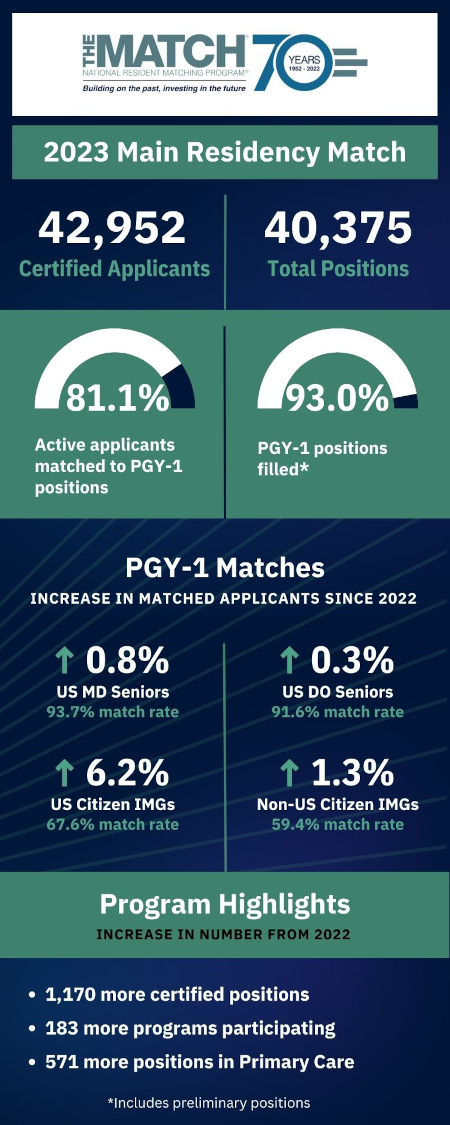
The medical school will welcome its newest cohort of resident physicians to Kalamazoo and Battle Creek this summer following a successful Match Day that saw WMed’s 10 residency programs fill every available training slot.
The results, announced on Friday, March 17, were part of the 2023 Main Residency Match, which was the largest on record, according to the National Residency Matching Program (NRMP). This year's Match was made up of 48,156 registered applicants and 40,375 positions, which was 1,170 more than last year. Additionally, the number of available first-year (PGY-1) positions rose to 37,425, an increase of 1,148 from last year.
“We at WMed are very pleased with the results of the Match, and we are delighted to welcome these new residents and fellows to the Kalamazoo medical community,” said David Overton, MD, Associate Dean for Graduate Medical Education.
The new group of 77 resident physicians includes nine residents who are participating in MIDOCs, a program from the state of Michigan which expands residency training positions in select specialties. MIDOCs residents go on to practice in underserved areas of Michigan in exchange for loan repayment. The newest MIDOCs residents coming to WMed will join our Family Medicine-Kalamazoo, General Surgery, Internal Medicine, Pediatrics, and Psychiatry residency programs.
In addition to Family Medicine, General Surgery, Internal Medicine, Pediatrics, and Psychiatry, the medical school has residency training programs in Emergency Medicine, Medicine-Pediatrics, Obstetrics and Gynecology, and Orthopaedic Surgery, as well as fellowships in Emergency Medical Services, Forensic Pathology, Hospice and Palliative Medicine, Simulation, and Sports Medicine.
The new residents will begin their training in July. The medical school will also welcome new fellows to its EMS, Forensic Pathology, Hospice and Palliative Medicine, and Sports Medicine fellowship programs.
The group of new resident physicians includes five students from WMed’s Class of 2023. The students were part of a class that saw 99 percent of its students enter into a residency program in specialties ranging from Family Medicine and General Surgery to Internal Medicine and Neurology.
Match Day is a time-honored event held at medical schools across the country. It represents a pinnacle moment for graduating medical students as the course of their medical careers is determined and they learn where they will spend the next three or more years for residency training. Residents practice medicine in a clinical setting under the supervision of fully licensed physicians.
The Main Residency Match process begins in the fall for applicants usually in the final year of medical school, when they apply to residency programs at which they would like to train. Program directors review applications and conduct candidate interviews in the fall and early winter. From mid-January to late February, applicants submit to NRMP their rank order lists of preferred programs, and program directors rank applicants in order of preference for training. The NRMP uses a computerized mathematical algorithm to match applicants with programs using the preferences expressed on their rank lists.
About the NRMP: The National Resident Matching Program® (NRMP®) is a private, non-profit organization established in 1952 at the request of medical students to provide an orderly and fair mechanism for matching the preferences of applicants for U.S. residency positions with the preferences of residency program directors. In addition to the annual Main Residency Match®, the NRMP conducts Fellowship Matches for more than 60 subspecialties through its Specialties Matching Service® (SMS®).
